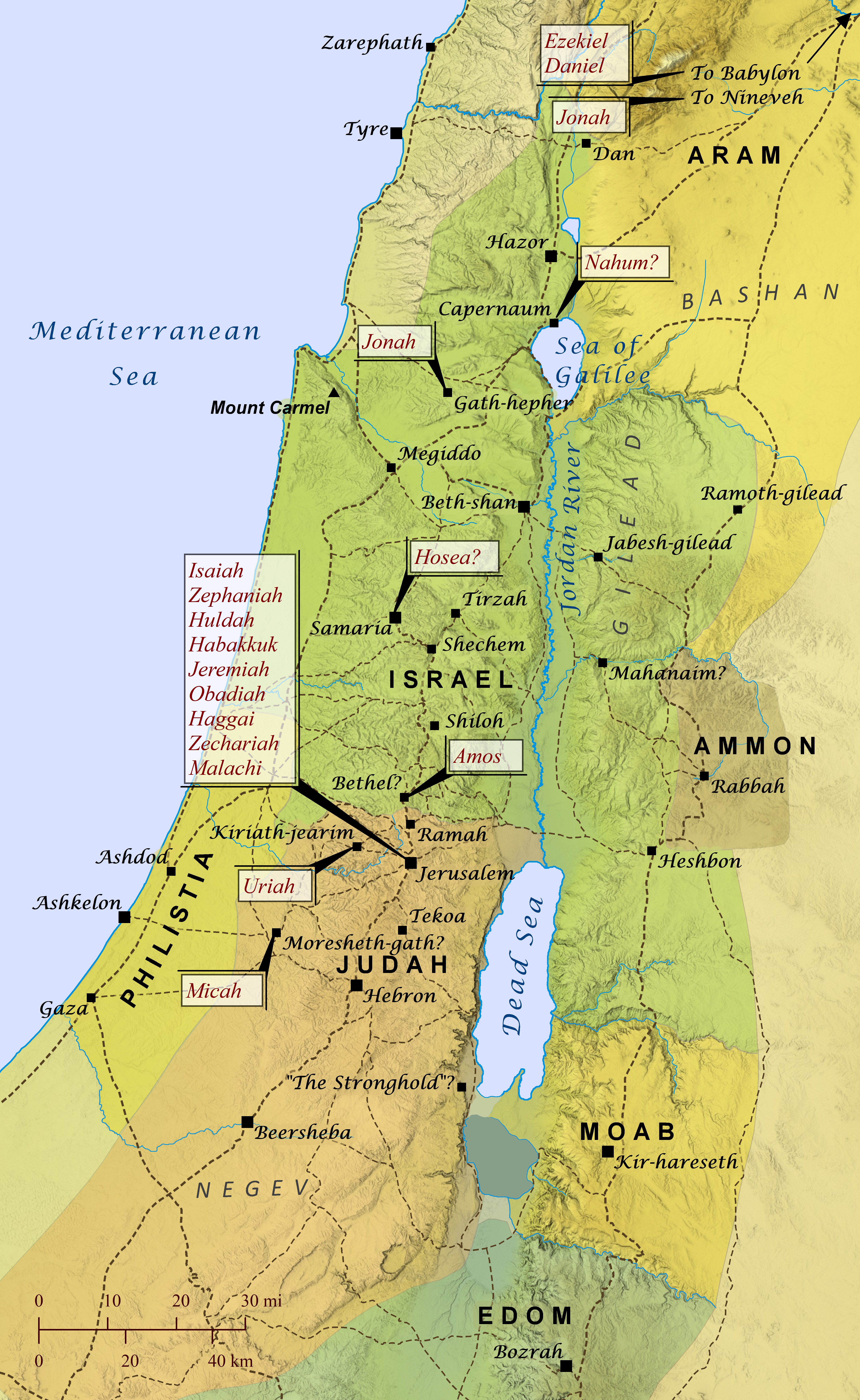Readers’ Version
Literal Version
1 In the eighth month of the second year of the reign of Persian King Dareyavesh (Darius), Yahweh spoke through the prophet Zekaryah (Zechariah, son of Iddo’s son Berekyah) saying,[ref] 2 “Yahweh was very angry with your ancestors, 3 so tell this to the people: Army commander Yahweh says that if you all turn back to me, I’ll return to you. 4 Don’t be like your ancestors who’d been told by the prophets that army commander Yahweh wanted them to abandon all their evil practices, but they wouldn’t listen or pay attention. That is Yahweh’s declaration.
5 “So where are you ancestors and the prophets now? Do they live forever? 6 But your ancestors didn’t obey my words and my decrees that I commanded through my servants the prophets, but they eventually repented and said, ‘Army commander Yahweh has done to us just what our ways and actions deserved.’ ”
2 YHWH He_was_angry towards ancestors_of_your(pl) anger.
3 And_say to_them thus YHWH he_says hosts return to_me the_utterance_of YHWH hosts and_return to_you(pl) YHWH he_says hosts.
4 Do_not be like_ancestors_of_your(pl) whom they_proclaimed to_them the_prophets the_former to_say thus he_says YHWH hosts turn_back please from_ways_of_your(pl) the_evil and_deeds_of_your(pl)[fn][fn] the_evil and_not they_listened and_not they_paid_attention to_me the_utterance_of YHWH.
5 Ancestors_of_your(pl) where are_they and_the_prophets the_to_forever do_they_live.
6 Nevertheless messages_of_my and_regulations_of_my which I_commanded DOM servants_of_my the_prophets am_not did_they_overtake ancestors_of_your(pl) and_repented and_they_said just_as he_planned YHWH hosts for_doing to/for_us according_to_ways_of_our and_according_to_deeds_of_our so he_has_done with_us.
7 About three months later, Yahweh spoke again through the prophet Zekaryah (Zechariah son of Iddo’s son Berekyah) saying, 8 “I had a vision in the night, and was surprised to see a man riding on a red horse,[ref] and then he was standing among the myrtle trees that are in the valley, and behind him there were red, reddish-brown, and white horses.”[ref] 9 I asked, “What are these things, my master?”
Then that heavenly messenger who talked with me told me, “I’ll show you what those things are.”
10 Then the man who stood among the myrtle trees answered and said, “Those are the ones that Yahweh has sent out to roam throughout the world.”
11 They answered Yahweh’s messenger who stood among the myrtle trees, telling him, “We’ve been roaming throughout the world, and see, the whole world sits contentedly and is at peace.”
12 “Army commander Yahweh,” Yahweh’s messenger asked, “how long before you show compassion to Yerushalem and to the cities of Yehudah (Judah), which you’ve been angry with for the past seventy years?”
13 Then that messenger who’d talked with me was answered by Yahweh with kind and comforting words, 14 and that messenger told me, “Call out and say, ‘Army commander Yahweh says this: I’ve been very jealous for Yerushalem and for Tsiyyon (Zion). 15 I’m very angry with the countries that are at ease—I was only a little angry with them, but they made the disaster worse. 16 Therefore Yahweh says: I will show mercy Yerushalem again. My residence will be built within her, and the measuring line will be stretched out over her. That’s what army commander Yahweh declares.
17 “Again, call out and say, ‘Army commander Yahweh says this: My cities will once again overflow with goodness, and I will again comfort Tsiyyon and choose Yerushalem.’ ”
8 I_saw the_night and_see/lo/see a_man was_riding on a_horse red and_he was_standing between the_myrtle_trees which in/on/at/with_ravine and_behind_him horses red sorrel and_white.
9 And_asked what are_these my_master and_he/it_said to_me the_messenger the_talking in/on/at/with_me I show_you what they are_these.
10 And_answered the_man the_standing between the_myrtle_trees[fn] and_said these are_those_whom he_has_sent YHWH to_patrol on_the_earth.
11 And_answered DOM the_messenger_of YHWH the_standing between the_myrtle_trees and_they_said we_have_gone_about in/on_the_earth and_see/lo/see all_of the_earth/land is_dwelling and_in_peace.
12 And_ the_messenger_of _said of_YHWH and_said Oh_YHWH hosts until when you not will_you_have_compassion_on DOM Yərūshālam/(Jerusalem) and_DOM the_cities_of Yəhūdāh/(Judah) which you_have_been_indignant this seventy year[s].
13 And_ YHWH _answered DOM the_messenger the_talked in/on/at/with_me messages good messages comfort(s).
14 And_he/it_said to_me the_messenger the_speaking in/on/at/with_me proclaim to_say thus YHWH he_says hosts I_am_jealous for_Yərūshālam/(Jerusalem) and_for_Tsiyyōn/(Zion) jealousy great.
15 And_anger great I am_angry towards the_nations the_at_ease that I I_was_angry a_little and_they they_have_helped to_disaster.
16 For_so/thus/hence thus YHWH he_says I_have_returned to_Yərūshālam/(Jerusalem) in/on/at/with_compassion house_of_my it_will_be_rebuilt in/on/at/with_it the_utterance_of YHWH hosts and_measuring_line[fn] it_will_be_stretched_out over Yərūshālam/(Jerusalem).
17 Again proclaim to_say thus YHWH he_says hosts again cities_of_my they_will_overflow with_prosperity and_ YHWH _comfort again DOM Tsiyyōn and_choose again in/on/at/with_Yərūshālam/(Jerusalem).
1:4 OSHB variant note: ו/מעלילי/כם: (x-qere) ’וּ/מַֽעֲלְלֵי/כֶ֖ם’: lemma_c/4611 n_1.0 morph_HC/Ncmpc/Sp2mp id_38fsu וּ/מַֽעֲלְלֵי/כֶ֖ם
1:4 OSHB note: We agree with both BHS 1997 and BHQ on an unexpected reading.
1:10 OSHB note: We agree with both BHS 1997 and BHQ on an unexpected reading.
1:16 OSHB variant note: ו/קוה: (x-qere) ’וְ/קָ֥ו’: lemma_c/6957 b morph_HC/Ncmsa id_38wA4 וְ/קָ֥ו
18 Then I looked up and wow, I saw four horns. 19 I asked the messenger who’d talked with me, “What are those?”
“Those are the horns that have scattered Yehudah, Yisrael, and Yerushalem.” he answered.
20 Then Yahweh showed me four craftsmen 21 and I asked, “What are those people coming to do?”
“Those horns are the nations that scattered Yehudah so that everyone went into hiding,” he answered, “But the blacksmiths have come to terrify the horns—to amputate the horns of the nations that attacked Yehudah, scattering the people.”

